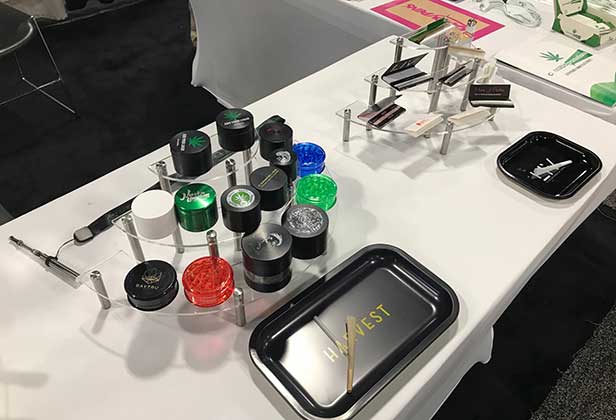Canadian News October 23, 2019
New Cannabis Promo Restrictions Go Into Effect in Canada
The Canadian government has released new limitations on advertising cannabis products and services that will impact the promo industry.
The amendments, announced in June, took effect last week. While edibles and cannabis vaping products are now legal, among the changes are more restrictions on branding practices, including limiting the size of imprints to 300 square centimeters and stipulating that the height of the lettering may not be more than 4 centimeters. And while products such as T-shirts and hats may still be employed for promotional use, the legislation only allows one brand element to be shown on each item, in order to “reduce the impact of the promotion.”
Last October, Canada officially legalized recreational cannabis across the country after months of back and forth among politicians, community leaders and producers. Money News National, a financial news outlet in Vancouver, BC, says 1.5 million people have used legal pot in the year since legalization. By 2024, the number could climb to 7.3 million.
At the time of legalization last year, marijuana companies were told they can’t use glamorous imagery, testimonials, celebrity endorsements or mascots to promote their products, and advertising must also steer clear of places “frequented mainly by young persons or that is visible from such a place,” such as schools, public playgrounds and daycare facilities. Those limits are still in force.
Some legal producers are frustrated at the additional restrictions. Jim Southam is the owner of a Prairie Cannabis retail store in Saskatchewan, and a member of the Saskatchewan Independent Cannabis Retailers Network. He told CTV News Saskatoon that producers are being held to stricter regulations than alcohol companies.
“By restricting what retailers can do is just inhibiting our opportunity to win over the black market and increase awareness about cannabis,” he said. “We’re hoping there are some changes coming, but we already feel like we have our hands tied behind our back with the advertising restrictions that are in place today. It’s really putting us at a disadvantage when looking at what alcohol sales are doing. We need to try to normalize it and not make people more afraid of it.”
In the meantime, promo industry companies are compelled to work within the legislation’s limitations. Russell Bird, owner of The Promo Addict (asi/302225) in Sherwood Park, AB, told ASI Canada that he’s seen a lot of cannabis companies taking their chances and flaunting the rules, including direct mail pieces that could appeal to youth, roadside signs and even people standing on street corners waving those signs. Bird contacted the Alberta Gaming and Liquor Control Board, whose inspectors manage compliance in the province. For now, they told him, they’re focusing more on education of the law and less on penalties. But that will most likely change in the near future.
“I caution my clients on making sure they follow the rules, because you don’t know when they’ll start enforcing them,” Bird said. “Right now, the people who push the boundaries of what’s acceptable definitely have an unfair advantage over those who choose to follow the rules.”
With the new restrictions in place, it’s now more important than ever that suppliers and distributors in the promo space stay up to date on the changing legislation. “Everyone in our company reads mandatory info on the new laws and regulations in the U.S. and Canada daily,” said Ryan Tickle, vice president of sales at Cannabis Promotions (asi/42996) in Florida, which sells into Canada and was recently an exhibitor at the Promotional Product Professionals of Canada (PPPC) National Convention. “We keep up with the new laws in order to help our distributors become compliant, so they can, in return, help their clients. This is a huge market, and we’re excited to bring everyone together and grow this community.”

Cannabis Promotions' booth at the PPPC National Convention in Toronto showcased a variety of marijuana promo products, including grinders and rolling papers.
Tickle says suppliers, distributors and end-buyers selling within or into Canada need to take the time to read The Cannabis Act and the updated information on promotional product restrictions, and also know province-specific regulations to make sure they’re in compliance. Hiring a cannabis attorney to make sure all promotions are legal is a good idea as well, he said, since penalties can reach up to $1 million.
“We have to understand why these restrictions are in place,” Tickle said. “We should embrace them and not view them as hindrances. They protect the public health and safety, and also make sure that cannabis doesn’t get abused or end up in the wrong hands. Because it’s so new and rapidly growing, it’s important to regulate it so it doesn’t get a bad reputation and then end up being banned entirely.”
At his distributorship, Bird’s team is committed to imprinting within the law’s restrictions. “We don’t produce anything that violates provincial or federal legislation, he said. “I feel that the restrictions are appropriate and that everyone should be held to the same standard of attempting to keep cannabis and cannabis-related advertising out of the hands of children.”
It’s a rapidly changing industry that will actually benefit from more oversight, Tickle said. Far from the old Cheech and Chong stoner stereotype, new dispensaries, many of them backed by venture capital, feature upscale décor and premium packaging, and attend a lot of trade shows. Additionally, the repeat orders of loyal customers make it an ideal industry for branded merchandise.
“It’s our job to show our distributor clients how competitive the market is,” Tickle said, “and how they can brand items to help their customers grow and beat the competition.”
